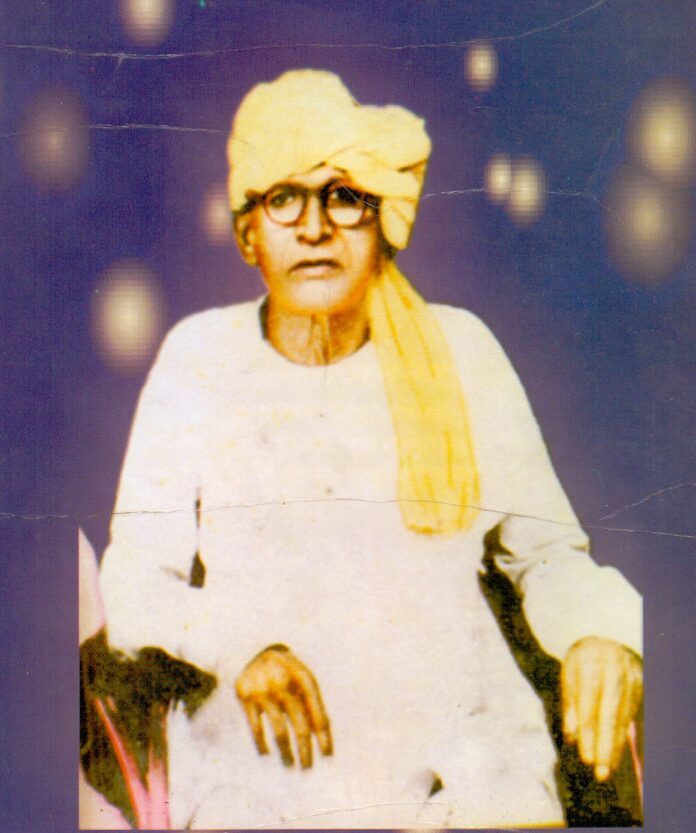
Bhikhari Thakur was a maestro who transformed Bhojpuri traditional folk entertainment
Niraj Krishna
The legend Bhikhari Thakur, who became vibrant in his lifetime, was born on December 18, 1888, in the impoverished family of a barber in the Kutubpur village of the old Saran district in pre-independent India. At that time, no one knew that this destitute boy would one day become the voice of Bhojpuri folk. Bhikhari Thakur, a pioneering artist in folk dance and acting, vividly portrayed the struggles and sufferings of his laborious life in a completely new style and dimension.
Bhikhari Thakur was a maestro who transformed Bhojpuri traditional folk entertainment, such as dance, into a captivating spectacle through his unique innovations. He excelled in making Bhojpuri songs, music, dance, and acting universally appealing through his social commentaries. He was an exceptional playwright, an extraordinary actor, a poignant lyricist, and an artist with a transformative consciousness in the realm of folk art.
Bhikhari Thakur was not only a folk artist but also a wandering performer. Throughout his life, he traveled from Kutubpur to Channanpur, then to Hawda, Puri, Motihari, Muzaffarpur, Dhanbad, Asansol, Hazaribagh, Patna, Banaras, Fatnapur, and other villages and towns. Although each of his journeys had a specific purpose – to complete the Saate dance sequence – his travels continually refined his humanity and creativity, making them subtle, powerful, and accessible.
The stage for his dance performances served as a laboratory for his creativity (Pat lekhan) and acting. He consistently modified the audience’s likes and dislikes in presentations such as Pat (drama), acting, and humour (Labari, Jokrai). As the plays performed in his shows, known as ‘Pat,’ began to appeal to the audience, he considered it complete only when it received overall acceptance. Then, using some other issue as a foundation, he would start composing a new ‘Pat.’ In this way, Bhikhari Thakur’s dance drama became a monumental task in the participation of the general public in the creation, development, and entertainment of the people. Without understanding this transformative and creative aspect of Bhikhari Thakur, it is impossible to comprehend his contribution to the world of performing arts.
Bhikhari Thakur was not only a folk artist but also a destitute traveler. Throughout his life, he traveled from Kutubpur to Channanpur, then to Hawda, Puri, Motihari, Muzaffarpur, Dhanbad, Asansol, Hazaribagh, Patna, Banaras, Fatnapur, and other villages and towns. Although each of his journeys had a specific purpose, they constantly refined and enriched his humanity and creativity, making them subtle, powerful, and accessible.
While each trip aimed to fulfil the requirements of his dance performances, they simultaneously served as a laboratory for his humanity and creativity. The presentations of his dance troupe, encompassing scriptwriting, acting, and comedy, underwent changes based on the audience’s preferences. When the plays performed in his dance dramas, known as “pat” (dramas), began to resonate with the audience, only then did he consider them complete in all aspects. Then, using another issue as a foundation, he would begin creating a new “pat.”
In this way, Bhikhari Thakur’s dance drama was a monumental task involving the participation of the general public in the creation, development, and entertainment of the people. Understanding the transformative and innovative aspects of Bhikhari Thakur’s work is impossible without comprehending this.
Bhikhari Thakur’s birth occurred during a period that was extremely gloomy for the Indian populace. The defeat in the 1857 Independence Struggle left Indian society deeply entrenched in the quagmire of superstition, illiteracy, and inequality. The East India Company was systematically dismantling traditional industries and businesses through its atrocities and oppressive policies. Agriculture was entirely dependent on traditional and weather-dependent practices. Unemployment and destitution were on the rise due to a shortage of labour.
The society was helpless and apathetic in the face of the whims of the wealthy. The society was subdued and resigned. It was dominated by intermediaries, and common people were falling victim to the deceitful practices of these intermediaries. Ordinary people were becoming vulnerable in the clutches of the middlemen, leading to their economic downfall.
In this context, it was natural for Bhikhari Thakur’s awakened consciousness to be moved by these truths. His creative talent made these truths an integral part of Bhojpuri life’s traditional “Launda Naach” (folk dance). Using these truths as a foundation, he composed songs and plays, crafted dramas, and performed them. He identified the hidden artistic talents within hardworking individuals often considered ignorant and uncultured, and he recognized and nurtured them. Characters like Sultana Daku, Putli Bai, Bhakt Prahlad, Prithviraj Chauhan, etc., were woven into the fabric of “pats” through his innovative acting, making the Launda Naach a true reflection of reality. Through the multifaceted presentations of his dance troupe, he made significant efforts in raising awareness in the village-society, striking against prevalent malpractices, superstitions, immoralities, and distortions.
For the compositions in his dance troupe, Bhikhari Thakur wrote significant plays, including “Beti Bechva,” “Bahra-Vihar,” “Kaljug Prem,” “Videsiya,” “Beti Viyog,” “Biraha Bahar,” “Bhai Virodh,” “Gabar Ghichor,” “Siri Ganga Snan,” and more. These theatrical works are creative expressions of Bhikhari Thakur’s restless personality, viewed from the perspectives of depth and taste. They are powerful responses to social distortions. In creating them, Bhikhari Thakur experimented with new approaches, incorporating imaginative elements like “Labari” or “Jokarai” for transformation in emotional tones during “pat” performances. For this, he composed satire-infused humorous pieces. He carefully selected and trained characters according to the roles, and, most importantly, he composed touching songs and integrated them into “pats” and theatrical performances in a way that left the audience captivated. Particularly, in “Beti Bechva,” Bhikhari Thakur depicted the poignant tale of girls sold by elderly individuals in Bengal, Bihar, and Uttar Pradesh, portraying it with great compassion.
In the tradition of searching for employment, young people from backward and ailing states have been migrating to Kolkata. Among them was Bhikhari Thakur, who understood the pain of the wives left behind by the migrant youth and expressed it with complete empathy in his Bidesia drama. It is said that only he, during that era, filled the labourer community, from eastern Uttar Pradesh to distant Kolkata, with anguish and remorse, altering the life course of western laborers.
Bidesia’s popularity immortalized him. Bhikhari Thakur made the prevalent issues of contemporary society the subject of his dramas. In the initial three years of his life, he studied various forms of folk theater prevalent in Bihar, Bengal, Uttar Pradesh, Nepal, etc., and incorporated those forms into his folk drama. Ramleela, Rasleela, Jatra, Bhand, Dhobi, Netua, Gaud, and other folk theater forms were his favorite areas.
In contemporary Bharatendu era, Bhikhari Thakur experimented with various forms in the field of folk theater. He brought changes to traditional theatrical styles such as Mangalacharan and Sutradhar in his dramas. Not only that, but Bhikhari Thakur is credited with using an open stage in folk theater. Folk plays are performed on an open stage, enacted under the sky, with the audience sitting in the open field. A raised platform or a mound in front of a temple is often used as a stage in these performances. There are no curtains on these stages. The entire narrative is presented continuously on the stage without scene changes.
Bhikhari Thakur made an extraordinary contribution to the promotion and dissemination of the robust Bhojpuri language. In his time, Bhikhari Thakur and Bhojpuri became synonymous with each other. While embracing the peculiarities of his Bhojpuri society, Bhikhari Thakur, bearing the brunt of the shortcomings, especially the caste system and the agony of the caste hierarchy, used his plays to strike at the social order. Through his dramas, he made the oppressed, the Dalits, women, and the economically disadvantaged the central themes.
Bhikhari Thakur belonged to the barber caste himself, and being a member of a lower caste, he endured the harsh impacts of the cruel caste system prevailing in Bhojpuri society. This also led him to address the issue of caste discrimination multiple times in his plays. He not only highlighted local issues but also demonstrated his true nationalism by incorporating national problems into his folk performances. Moreover, without aligning with any political party, he played a crucial role in preparing the public to stand against foreign governments through his plays.
Thakur’s works stand as a testament to his commitment to social justice and his courage to challenge societal norms through the powerful medium of drama. His legacy continues to inspire those who value cultural and social change.
It is said that Gandhi’s efforts in the anti-addiction campaign were greatly influenced by his play ‘Kaliyug Prem Bhaya Nisai’, making a significant contribution. This is why the popularity of Lokman’s creator Bhikhari Thakur spread to different regions, including Bhojpuri, Magahi, and Maithili. Building on his popularity, he earned fame in the Bhojpuri region equivalent to Bharatendu Harishchandra. Rahul Sankrityayan wrote about his popularity, “How powerful is the language of Hamni, how fast it is, everyone has seen it in Bhikhari Thakur’s plays. People say, why is there so much craze for Bhikhari Thakur’s plays? Why is there a crowd of thousands even for ten times? For the sake of watching the play? It is known that in one such play… we can’t say that there are no flaws in Bhikhari Thakur’s plays. If there are flaws, it is not because of Bhikhari Thakur but because of the educated people. Those who watch Bhikhari Thakur’s plays with love, through their language, suggest some improvements, and all the flaws are rectified.”
Despite being born in a backward and neglected caste in Indian varna-ashram society, Bhikhari Thakur reached the pinnacle of fame and honor through his art and talent. People affectionately called him “Rai Bahadur.” He was also famous among familiar people as Malik Ji. His performances on stage, through dance and drama, often revolved around social anomalies, disparities, and injustices, leaving a significant impact on the audience. His performances had a magical effect on the viewers. Consequently, whenever and wherever his play was staged, people from the surrounding villages would flock to witness it. His popularity grew to such an extent that nearby police officers had to be present with their police force to control the crowds at his performances.
Bhikhari Thakur was a compassionate and generous person. He was as simple and kind-hearted as he was an accomplished artist. Common people considered him as their own representative, while landlords and aristocrats were the different facets of his life for the working-class society. The labour community in eastern Uttar Pradesh and Bihar, working in coal mines in places like Dhanbad, Jharia, Asansol, Rani Ganj, Haldia, Kharagpur, and tea gardens in Bengal, as well as from Assam, had a deep connection with Bhikhari Thakur. He often interacted with these people through his dance troupe. His Bidesia play had gained immense popularity in Kolkata, and later, a film was made based on it. Bhikhari Thakur played a brief role in this film. The film was not only showcased in India but also gained popularity among Bhojpuri expatriates in countries like Mauritius, Kenya, British Guiana, Suriname, Madagascar, Burma, Trinidad, and others.
In independent India, Bhikhari Thakur was highly esteemed by his admirers. Both Kashi Naresh Tribhuvan Narayan Singh and the Governor of Bihar, Anant Shyam Ayyangar, honored him with certificates, citations, and traditional garments. He was affectionately known as “Botohi Bhaiya” among the Bhojpuri people. Even today, in villages, women perform his plays, becoming Botohi baba and enacting scenes to bring back their estranged husbands. The great scholar Rahul Sankrityayan rightly referred to him as the Shakespeare of Bhojpuri. They envisioned the India of the twenty-first century. They repeatedly paid homage to the great nurturer of human equality and human dignity.


